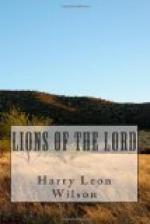CHAPTER I.
The Dead City
The city without life lay handsomely along a river in the early sunlight of a September morning. Death had seemingly not been long upon it, nor had it made any scar. No breach or rent or disorder or sign of violence could be seen. The long, shaded streets breathed the still airs of utter peace and quiet. From the half-circle around which the broad river bent its moody current, the neat houses, set in cool, green gardens, were terraced up the high hill, and from the summit of this a stately marble temple, glittering of newness, towered far above them in placid benediction.
Mile after mile the streets lay silent, along the river-front, up to the hilltop, and beyond into the level; no sound nor motion nor sign of life throughout their length. And when they had run their length, and the outlying fields were reached, there, too, was the same brooding spell as the land stretched away in the hush and haze. The yellow grain, heavy-headed with richness, lay beaten down and rotting, for there were no reapers. The city, it seemed, had died calmly, painlessly, drowsily, as if overcome by sleep.
From a skiff in mid-river, a young man rowing toward the dead city rested on his oars and looked over his shoulder to the temple on the hilltop. There was something very boyish in the reverent eagerness with which his dark eyes rested upon the pile, tracing the splendid lines from its broad, gray base to its lofty spire, radiant with white and gold. As he looked long and intently, the colour of new life flushed into a face that was pinched and drawn. With fresh resolution, he bent again to his oars, noting with a quick eye that the current had carried him far down-stream while he stopped to look upon the holy edifice.
Landing presently at the wharf, he was stunned by the hush of the streets. This was not like the city of twenty thousand people he had left three months before. In blank bewilderment he stood, turning to each quarter for some solution of the mystery. Perceiving at length that there was really no life either way along the river, he started wonderingly up a street that led from the waterside,—a street which, when he had last walked it, was quickening with the rush of a mighty commerce.
Soon his expression of wonder was darkened by a shade of anxiety. There was an unnerving quality in the trance-like stillness; and the mystery of it pricked him to forebodings. He was now passing empty workshops, hesitating at door after door with ever-mounting alarm. Then he began to call, but the sound of his voice served only to aggravate the silence.
Growing bolder, he tried some of the doors and found them to yield, letting him into a kind of smothered, troubled quietness even more oppressive than that outside. He passed an empty ropewalk, the hemp strewn untidily about, as if the workers had left hurriedly. He peered curiously at idle looms and deserted spinning-wheels—deserted apparently but the instant before he came. It seemed as if the people were fled maliciously just in front, to leave him in this fearfullest of all solitudes. He wondered if he did not hear their quick, furtive steps, and see the vanishing shadows of them.




